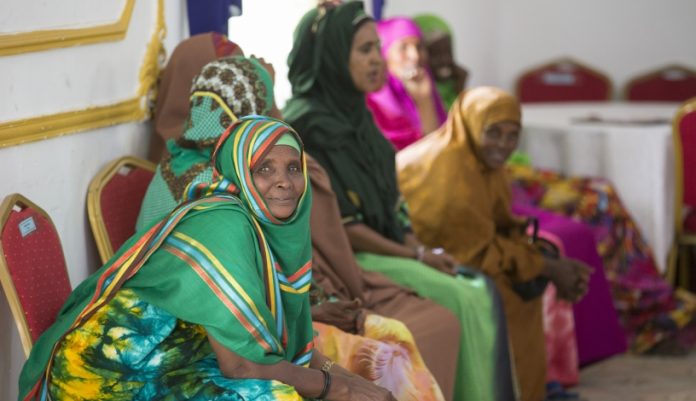In Somaliland, judges and civil society have never had the opportunity to sit down and discuss how to improve justice provision for all citizens. But in September 2018, these two groups sat down together in September in a participatory workshop funded by the Knowledge Platform Security and Rule of Law, to discuss obstacles – and potential solutions – to fair and accessible justice for all citizens. This is just one of many encouraging signs for justice provision in Somaliland but will need to be built upon to deliver on ambitious plans to improve access to justice for all, write Guleid Ahmed Jama and Jordan Street.
Over the past few years, Chief Justice Adam Haji-Ali Ahmed has made some impressive strides in his efforts to improve access to justice in Somaliland. During his tenure, new courts have opened in 12 districts which previously had none, a series of new mobile supreme and lower courts have helped bring the judiciary to some of the remotest locations in Somaliland, and efforts have been made to improve hiring practises to promote equality in the judicial sector. Yet, for all the positive steps, there is still a long way to go before all of Somaliland’s citizens have fair and affordable access to justice.
Somaliland is by no means unique in this standing. An oft quoted figure from 2008 – that is in need of updating – indicated that 4 billion out of the world’s 6 billion (and counting) citizens live without fair and readily available access to justice. However, over the past couple of years, there is a growing international movement, spurred on by the inclusion of justice as a priority within the 2030 Agenda for Sustainable Development, to address these serious access to justice shortcomings around the world. The Global Taskforce on Justice – a group of governments, organisations and networks committed to achieving access to justice for all – are leading this charge.
In Somaliland, evidence of this movement is beginning to emerge, with a number of active civil society organisations making the case to the government to recognize the links between access to justice and eradicating extreme poverty. Early efforts by these civil society groups to localise the Sustainable Development Goals (SDGs) with the government in Somaliland, including the support to help incorporate many SDG16 targets in the new Somaliland National Development Plan, together with the recent identification of access to justice as a short-term priority action for civil society across Somaliland, show that there is interest in taking forward action in this field.
It was against this backdrop that the Somaliland Human Rights Centre, together with Saferworld(two of the 6 founding members of the Somaliland SDG16+ Coalition), co-organised a three-day participatory workshop with the Ministry of Justice and the Office of the Chief Justice, to discuss new approaches for improving access to justice in Somaliland, funded by the Knowledge Platform Security & Rule of Law’s Knowledge Management Fund. Framing the workshop under the guise of the 2030 Agenda and SDGs provided a new way of talking about justice issues, that enabled a discussion that included the participation of many outside of those traditionally charged with making decisions on justice provision. With representatives of the judiciary from all regions of Somaliland, together with government ministries covering human rights, planning and policing, as well as civil society representatives and expert academics, the workshop embodied a central theme of SDG16+ – inclusivity – to generate new ways of addressing another key SDG16+ theme – justice.
Using a modified problem-tree analysis method, participants reviewed gaps and challenges in six areas: legal frameworks, legal knowledge, advice and representation, access to dispute mechanisms, fair procedure, and ability to enforce solutions. In each area, participants explored root causes and barriers before collectively proposing solutions. For most participants, this was their first opportunity to discuss the strengths and weaknesses of judicial policies, current laws and institutional priorities with people from different sectors. Mixing legal practitioners, advocates, academics and civil servants allowed attendees to challenge one another, identify blockages and to think outside the box for improving access to justice across the country. The participatory approach helped build up a comprehensive picture of what people need and want when they seek justice, what kind of justice they receive, and – for justice providers – how they can be more effective.
Over the coming months, the Human Rights Centre and Saferworld will use the outcomes of the workshop to develop a guidance note for the Chief Justice, which will help to inform a new vision for access to justice in Somaliland. But more needs to be done to capitalise on this initial collective problem-solving.
First, it will be important to replicate this approach in each of the six regions of Somaliland, making a concerted effort to ensure that those most likely to be excluded from decision making on justice issues – women, youth and minorities – are able to share their experiences so that a new vision for access to justice takes account of all citizens. Second, their participation must go even deeper. They must be able to provide feedback on how the justice sector is performing, to allow for continuous review on whether justice provision is meeting people’s needs. Special attention should continue to be focused on achieving gender parity in the entire justice sector – the involvement of citizens and civil society groups will be paramount to achieving this goal. Women must be accepted into more leadership roles within justice institutions, and there should be a roadmap for hiring female judges over the coming years. Finally, once priorities are set around inclusive access to justice, there must be sufficient investment to match these goals and make them a reality. The championing of this agenda by the Chief Justice can only go so far unless the necessary funds are mobilised.
Ultimately, it is in the government of Somaliland’s interest to make access to justice a central priority over the coming years. As Germán Carlos Garavano, Minister of Justice and Human Rights in Argentina, wrote in a recent article explaining the rationale for the Global Taskforce on Justice, ‘justice is the missing link in every effort we make to defeat poverty and to deliver the 2030 Agenda on Sustainable Development.’ If the government of Somaliland is serious about ending poverty and achieving the SDGs, then it needs to heed this call and invest in improving access to justice for all citizens.
The Global Taskforce on Justice is in the process of preparing a comprehensive case for global investment in justice that will cover the major social, economic and environmental benefits it will bring, while unpacking the true costs of injustice: increased poverty and social exclusion, crime and violence, corruption, political instability and violent conflict. It will also outline the damage caused by counter-productive expenditure in areas such as hard security, criminal justice, pre-trial detention and incarceration that only address the symptoms of injustice rather than its causes. This piece of work will help make the business case that is beginning to be made by civil society organisations in Somaliland today.
Somaliland still has an ‘opportunity to be at the forefront of 2030 Agenda implementation in the Horn of Africa and be an example for the world’ – but only if access to justice for all citizens is given the attention it desperately needs.
This comment piece was originally posted on Knowledge Platform and funded under the Knowledge Management Fund.
Photo credit: Kate Stanworth/Saferworld
Source: Saferworld.































